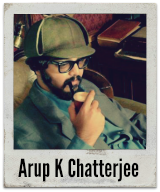|
by Arup K Chatterjee
[1] The conscience of a blackened street
Impatient to assume the world… I am moved by fancies that are curled
Around these images, and cling:
The notion of some infinitely gentle
Infinitely suffering thing.
(“Preludes,” T.S. Eliot) “The thundak[2] of her fingers’ wedges —
In a sea town: Plymouth of fish and chips
And other such joints of curios and gauntlets —
Around the throbbing nubz[3] of my organ …
Such is the atmosphere when she spoke:
“I sell the paradoxes of the night along
The final hours of dusk; will you come
To my wharf? It faces the canal
I will show you the cobblestone-footprints
On a road made of cerise mustard.
I have been bleeding on them all the way
To here; and there are on either side
Blue and green and ochre…lavender
Awnings on the gardened cafes, from each of which
They pulled me by the wrist, in exchange of ferrous froth.”
The sails are flaccid, discoloured, jaded
The evening sky is marmaladed: she eats an apricot and wipes her chin
And scratches away from its skin
A pollen of maple stuck across
The semen, from her mouth, on the naked floss…
“Khuda parast, [4] I’ll make a fortress for you
With a gateway of an alloy of calcium from my thighs
And Portland stone, and certain mysteries
Of desires abducted from near Batten’s Mount
It will be your own, to feel my crevice
Like a painted harem for your painted kiss
The perfect stone, sombre, sonorous, your perfect solipsism
I will burn like radium on a painted clock,
My limbs widening into the hours of your night.”
The chatter on the streets awakens the dying song of a swan
The streets thwart, and squirm athwart, like the streets of Ballimaran[5]
The carousers by the tide, around the Hoe
Like in a requiem, they linger, arrive and go
Or, throng by can you hear the drums Fernando
Playing from a tavern, or in another saloon:
We’re lost in this masquerade; so, I said: Take me to your home — this is blasphemy
And she: sawaal keeje, guzaarish naheen[6]
So she takes me to the nearest café
The only question I can ask, if she is visible to all Her skin, the muslin of turmeric, her eyes, the cerulean of a jheel[7]
I blow on my sugarless earl grey; hers is chamomile
The paincheeda[8] gullies of Barbican respire
Like the splash in the water off a heron’s descent
She walks ahead trenchantly pleading a tedious argument
“Take me in exchange of your iman-o-deen[9]
Let the citrus of your palette colour me tangerine…”
She took my hand and spread her lips, still tattered, still makhmali[10]
My hand scuttled over her breast, just like in exile
Or a hanging tile recalcitrant on the edge, or a marine beast in her thrall
I touched her — a spirit void of flesh — stroking her infinitesimally
She leant on the wall as frailly as one abandoned mausoleum’s broken wall
The smoke from a nearby burning of wood
Deposited its pheromones all over that city,
Upon our godless density,
And all the godly faces within our reach
Dotted upon a brocaded kaleidoscope —
Of street lamps and awnings and wood-shavings
And of the shops of the stopped aluminium clocks
Left unpeopled in our oral engravings
Of the pasteurised homilies we wrote with our nails.
She refused the slips of paper with the faces of Elizabeth;
We struggled from our arms to our arms in a kind of nocturnal faith…”
He rose to go, and I pleaded like a pedlar from the black market
“Stay … tell me what happened then? Did she take you home?
Did you leave her behind in Plymouth, or did someone take her away?”
He felt uneasy, like a prophet made to answer for the sorrow of a lamb
Or a sonneteer too infantile in his quest for the most seamless iamb
“I cannot tell you everything. It is time now for my prayer.”
He uplifted the rim of his kaftan from the chair
And while leaving, stopped momentarily by my clock
And stroked the greening bronze of the uneven circumference
Reduced to a powdered dial behind a powdered lens
He reached with a hand inside his cloak, upon the right of his breast
Took out his pocketwatch, nursed the skin, concealed by the evening’s glint
I could read it nevertheless, even before he suppressed,
Upon the back of the instrument, an inscription in the broken sunlight
My shadow will seek you as far you go, and he muttered out the rest
“A few more hours Qasim, [11] do not leave me tonight…”
[1] Karvat — Urdu meaning: To turn over a side in sleep; toss in bed while sleeping; Finnish meaning: Hairs. [2] Coolness. [3] Pulse; pulsation; artery. [4] Believer; Worshipper; God fearing. [5] A very old corner of Delhi, criss-crossed by innumerable narrow lanes and bylanes, also housing the haveli of Mirza Ghalib. [6] Urdu meaning: You may pose your query, but not your request. [7] Lake [8] Entangled; serpentine. [9] Faith and creed. [10] Velveteen. [11] The name of the son of Prophet Muhammed, meaning the distributor. Here, he is also the doppelganger of the narrator/poet.
This is the S econd Prize Winner of econd Prize Winner of Cha 's "The Other Side" Poetry Contest. Arup K Chatterjee on "Karvat": This poem is a mystic reflection of the everyday arousals of faith and eros, and their renunciations, which all of us undergo. It is born from the dialectic of travelling in an alien architecture of space and human body, and the impulsive urges to settle in it. The former and the latter rarely ever meet. [ Read Vinita Agrawal's commentary on "Karvat"] [ Back to "The Other Side"] |